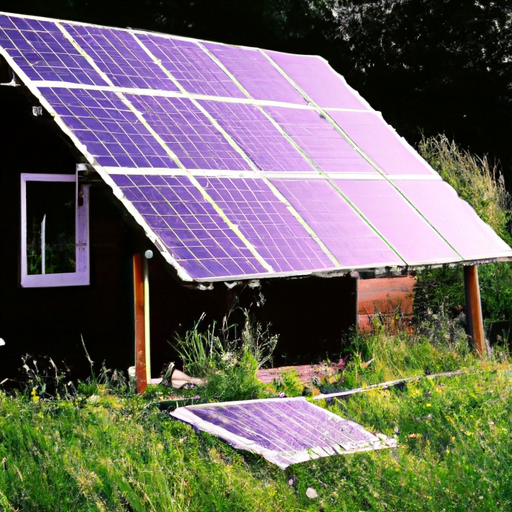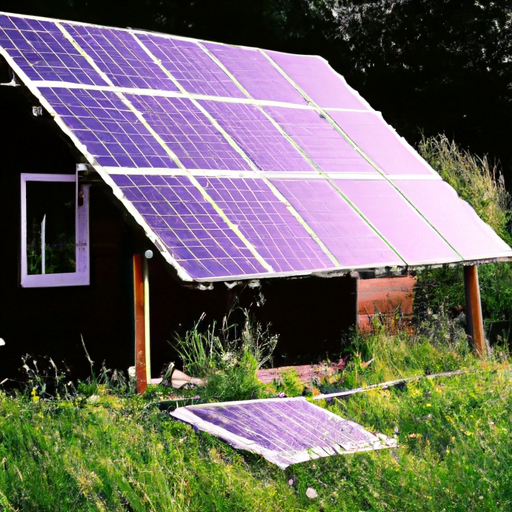I’ve always been curious about off-grid living and the idea of complete self-sufficiency. It’s fascinating to think about relying solely on renewable resources and disconnecting from the modern grid. But amidst my curiosity, I couldn’t help but wonder if there are any certifications or training programs that offer guidance and knowledge on this alternative lifestyle. After some research, I found that there are indeed certifications and training available for those interested in off-grid living, providing invaluable insights and skills to embark on this sustainable journey.

Certifications for Off-Grid Living
Living off-grid is becoming increasingly popular as people seek a more sustainable and self-sufficient lifestyle. However, navigating the world of off-grid living can be daunting, especially when it comes to acquiring the necessary skills and certifications. Fortunately, there are numerous certifications available that can help individuals gain the knowledge and recognition they need to thrive in off-grid living. In this article, I will explore the different types of certifications, the organizations that offer them, and the benefits they provide.
Types of Certifications
Certifications for off-grid living cover a wide range of topics, reflecting the diverse skills and knowledge needed to live off-grid successfully. Some of the most common certifications include those for renewable energy systems, sustainable agriculture, water management, shelter construction, and off-grid living skills. Each certification focuses on specific aspects of off-grid living, allowing individuals to tailor their training to their unique interests and goals.
Certification Organizations
Several organizations provide certifications for off-grid living. These organizations ensure that individuals receive training from reputable sources and meet specific standards. Some of the most well-known certification organizations include the North American Board of Certified Energy Practitioners (NABCEP) for renewable energy systems, the United States Department of Agriculture (USDA) for sustainable agriculture, and the International Rainwater Harvesting Alliance (IRHA) for water management. Each organization has its own set of criteria and requirements for certification, ensuring that individuals acquire the necessary skills and knowledge.
Benefits of Certifications
Certifications for off-grid living offer several benefits to individuals seeking a more sustainable lifestyle. Firstly, certifications provide a sense of credibility and recognition. By acquiring a certification, individuals can demonstrate their expertise and dedication to off-grid living practices, making them more attractive to potential employers or clients. Additionally, certifications often provide access to a network of professionals in the field, allowing individuals to connect, share ideas, and learn from one another. Finally, certifications can be a valuable tool for personal growth, enabling individuals to challenge themselves, expand their knowledge, and enhance their skills in specific areas of off-grid living.
Training for Off-Grid Living
In addition to certifications, training programs are another avenue for individuals to gain the necessary skills and knowledge for off-grid living. Training programs often offer more comprehensive instruction and hands-on experience than certifications alone. In this section, I will discuss the types of training programs available, the providers that offer them, and the skills and knowledge they cover.
Types of Training Programs
Similar to certifications, training programs for off-grid living encompass a wide range of topics. Some common types of training programs include those for off-grid energy systems, self-sufficiency, and water and food management. These programs often provide in-depth education on the design, installation, and maintenance of renewable energy systems, as well as practical skills for living off-grid, such as food preservation and natural resource management. Whether individuals are interested in developing their technical skills or learning practical strategies for self-sufficiency, there is a training program available to suit their needs.
Training Providers
Numerous organizations and institutions offer training programs for off-grid living. These providers may include universities, non-profit organizations, private companies, and community-based initiatives. Some well-known providers include the Solar Energy International (SEI) for off-grid energy systems training, the Earthship Academy for sustainable home construction, and the Permaculture Research Institute for permaculture training. Each provider brings its own expertise and approach to off-grid living, ensuring that individuals receive comprehensive and specialized training.
Skills and Knowledge Covered
Training programs for off-grid living cover a wide range of skills and knowledge necessary for a self-sufficient lifestyle. Participants can expect to learn about sustainable energy systems, agricultural practices, water management techniques, and shelter construction. They may also gain proficiency in areas such as wilderness first aid, survival skills, and homesteading. By combining theoretical knowledge with practical applications, training programs equip individuals with the tools they need to thrive in off-grid living.
Certifications vs. Training
While certifications and training programs both offer valuable education in off-grid living, there are some key differences between the two. Understanding these differences can help individuals determine which path is best suited to their needs.
Differences
Certifications are typically awarded upon successful completion of a standardized assessment that tests the individual’s knowledge and competency in a specific area of off-grid living. They serve as a formal recognition of one’s expertise and are often required or preferred by employers or clients. On the other hand, training programs provide more comprehensive education and hands-on experience. They focus on practical skills and often involve workshops, demonstrations, and mentorship. While certifications validate an individual’s knowledge, training programs help individuals develop and refine their skills through immersive learning experiences.
Complementary Nature
Certifications and training programs are not mutually exclusive. In fact, they can complement each other and enhance an individual’s overall education in off-grid living. By acquiring certifications, individuals can gain recognition and credibility, while training programs provide the opportunity to develop practical skills and gain hands-on experience. Combining both certifications and training can provide a well-rounded foundation for individuals pursuing a self-sufficient lifestyle.

Certifications for Renewable Energy Systems
Renewable energy systems are a cornerstone of off-grid living, providing individuals with reliable and sustainable sources of power. Certifications in this area validate an individual’s knowledge and expertise in designing, installing, and maintaining renewable energy systems. There are several certifications available for different types of renewable energy sources, including solar energy, wind energy, and hydroelectric power.
Solar Energy Certifications
Solar energy certifications are among the most sought-after certifications for off-grid living. They demonstrate an individual’s proficiency in harnessing the power of the sun to generate electricity. Some well-known solar energy certifications include the NABCEP Solar PV Installation Professional Certification, the Institute for Sustainable Power Quality (ISPQ) Certified Solar Installer, and the Solar Energy International (SEI) Solar Professionals Certificate. These certifications cover various aspects of solar energy, including system design, installation, maintenance, and troubleshooting.
Wind Energy Certifications
Wind energy certifications focus on harnessing the power of the wind to generate electricity. They are particularly valuable for individuals living in windy areas or those interested in setting up wind turbines as part of their off-grid energy system. The American Wind Energy Association (AWEA) offers a variety of wind energy certifications, including the AWEA Small Wind Turbine Installer Certification and the AWEA Wind Project Manager Certification. These certifications cover topics such as wind turbine installation, operations, and maintenance.
Hydroelectric Certifications
Hydroelectric power certifications are designed for individuals interested in utilizing water flow to generate electricity. Hydroelectric systems can be an excellent option for off-grid living, especially in areas with access to streams or rivers. The National Hydropower Association (NHA) offers the Certified Hydropower Professional (CHP) designation, which recognizes individuals with expertise in various aspects of hydroelectric power, including system design, operation, and environmental stewardship.
Certifications for Sustainable Agriculture
Sustainable agriculture certifications are essential for individuals aiming to grow their own food and practice environmentally responsible farming techniques. These certifications demonstrate an individual’s knowledge and commitment to organic farming, permaculture, and agroecology.
Organic Farming Certifications
Certifications in organic farming validate an individual’s adherence to organic production standards and the use of sustainable farming practices. The USDA Organic Certification is widely recognized and requires farms to meet specific criteria related to soil management, crop rotation, pest control, and animal welfare. Other certifications, such as the Certified Naturally Grown (CNG) and the Demeter Biodynamic certifications, provide additional recognition for those practicing sustainable farming with a focus on ecological balance and biodiversity.
Permaculture Certifications
Permaculture certifications are ideal for individuals interested in designing sustainable and regenerative systems that integrate human needs with the natural environment. The Permaculture Design Certificate (PDC) is the most widely recognized permaculture certification and covers topics such as ecological principles, sustainable design, food production, and community development. Obtaining a PDC equips individuals with the knowledge and skills to create resilient and abundant systems in off-grid living.
Agroecology Certifications
Agroecology certifications focus on the application of ecological principles to agriculture, emphasizing the importance of biodiversity, soil health, and social equity. These certifications validate an individual’s understanding of sustainable farming practices and their commitment to promoting ecological balance. The British Columbia Institute of Agrologists offers the Certified Agricultural Consultant (CAC) designation, which recognizes individuals with expertise in agroecology and sustainable agriculture practices.
Certifications for Water Management
Effective water management is crucial for off-grid living, ensuring a sustainable and reliable water supply. Certifications in water management cover topics such as rainwater harvesting, water treatment, and water conservation.
Rainwater Harvesting Certifications
Rainwater harvesting certifications validate an individual’s knowledge and skills in collecting, storing, and utilizing rainwater for various purposes. The International Rainwater Harvesting Alliance (IRHA) offers the International Rainwater Harvesting Professional (IRHP) certification, which covers topics such as system design, water quality, and legal considerations. This certification provides individuals with the necessary expertise to implement efficient and sustainable rainwater harvesting systems.
Water Treatment Certifications
Water treatment certifications focus on the purification and filtration of water for safe consumption. These certifications ensure that individuals possess the knowledge and skills needed to maintain clean and potable water in off-grid settings. The Water Quality Association (WQA) offers various water treatment certifications, including the Certified Water Specialist (CWS) designation, which covers topics such as water chemistry, treatment technologies, and system maintenance.
Water Conservation Certifications
Water conservation certifications are aimed at individuals interested in optimizing water usage and minimizing waste. These certifications demonstrate an individual’s understanding of water conservation strategies and their commitment to sustainable water practices. The Alliance for Water Efficiency offers the Certified Water Efficiency Professional (CWEP) designation, which covers topics such as water auditing, efficient irrigation systems, and conservation program management. Obtaining this certification enables individuals to contribute to the efficient use of water resources in off-grid living.
Certifications for Shelter Construction
Building an off-grid shelter requires specific knowledge and skills to create comfortable and sustainable living spaces. Certifications in shelter construction focus on green building practices, earthen building techniques, and tiny home construction.
Green Building Certifications
Green building certifications validate an individual’s understanding of sustainable building practices that minimize environmental impact. These certifications cover topics such as energy efficiency, sustainable materials, indoor air quality, and waste reduction. The Leadership in Energy and Environmental Design (LEED) certification, provided by the U.S. Green Building Council, is one of the most recognized and comprehensive green building certifications available. LEED certifications are available for various building types, including residential, commercial, and institutional.
Earthen Building Certifications
Earthen building certifications focus on the use of natural and locally sourced materials, such as clay, sand, and straw, in construction. These certifications demonstrate an individual’s ability to build structurally sound and energy-efficient earthen structures. The California Institute of Earth Art and Architecture offers the Earth Building Certification Program, which covers topics such as adobe construction, rammed earth techniques, and earthen plaster finishes. This certification provides individuals with the skills and knowledge to create sustainable and aesthetically pleasing structures in off-grid living.
Tiny Home Construction Certifications
Tiny home construction certifications are ideal for individuals interested in building compact and sustainable living spaces. These certifications validate an individual’s understanding of design principles, construction techniques, and safety considerations specific to tiny homes. The Tiny Home Industry Association (THIA) offers the Certified Tiny Home Builder designation, which covers various aspects of tiny home construction, including legal considerations, energy efficiency, and community zoning. By obtaining this certification, individuals can demonstrate their expertise in building small, sustainable homes for off-grid living.
Certifications for Off-Grid Living Skills
In addition to specialized certifications, there are several certifications available for essential off-grid living skills. These certifications focus on wilderness first aid, survival skills, and homesteading.
Wilderness First Aid Certifications
Wilderness first aid certifications are valuable for individuals living in remote locations, where medical assistance may not be readily available. These certifications provide training on emergency care in outdoor settings, covering topics such as wound management, CPR, and emergency response. The Wilderness Medical Society offers the Wilderness First Responder (WFR) certification, which is widely recognized and provides individuals with the skills to handle medical emergencies in resource-limited environments.
Survival Skills Certifications
Survival skills certifications are particularly relevant for individuals seeking self-sufficiency in remote or challenging environments. These certifications cover a wide range of skills, including fire building, shelter construction, wild edible foraging, and navigation. The Wilderness Awareness School offers the Wilderness Certification Program, which provides individuals with comprehensive training in survival and primitive skills necessary for off-grid living.
Homesteading Skills Certifications
Homesteading skills certifications validate an individual’s knowledge and competency in various aspects of self-sufficiency, including gardening, food preservation, animal husbandry, and natural resource management. These certifications demonstrate an individual’s ability to establish and maintain a productive homestead. The American Homesteaders Association offers the Certified Homesteader designation, which covers a broad range of skills and practices essential for thriving in an off-grid homesteading lifestyle.
Popular Training Programs for Off-Grid Living
In addition to certifications, there are several popular training programs available for individuals interested in off-grid living. These programs offer comprehensive education and practical experience, allowing individuals to acquire the necessary skills to thrive in a self-sufficient lifestyle.
Off-Grid Energy Systems Training
Off-grid energy systems training programs focus on the design, installation, and maintenance of renewable energy systems, such as solar, wind, and hydroelectric power. These programs provide individuals with hands-on experience and theoretical knowledge to become proficient in off-grid energy solutions. The Solar Energy International (SEI) offers a variety of training programs, including the Off-Grid Solar PV Design and Installation, Wind Power Basics, and Hydropower Design and Installation courses.
Self-Sufficiency Training
Self-sufficiency training programs encompass a wide array of skills and knowledge necessary for off-grid living. These programs often cover topics such as sustainable agriculture, food preservation, natural building, and resource management. The Earthship Academy offers an immersive training program that combines theoretical education with practical hands-on experience in sustainable home construction, off-grid systems, and community development.
Off-Grid Water and Food Management Training
Off-grid water and food management training programs focus on the essential skills for ensuring a sustainable water supply and growing one’s own food. These programs cover topics such as rainwater harvesting, water treatment, soil health, permaculture design, and food preservation. The Permaculture Research Institute offers training programs in various locations worldwide, providing participants with a comprehensive education in permaculture principles and practices.
Conclusion
Certifications and training programs are invaluable resources for individuals seeking to live off-grid. They provide the necessary knowledge, skills, and recognition to thrive in a sustainable and self-sufficient lifestyle. From renewable energy systems to sustainable agriculture, water management, shelter construction, and essential off-grid living skills, there are certifications and training programs available for every aspect of off-grid living. By acquiring certifications and participating in training programs, individuals can enhance their expertise, connect with like-minded individuals, and embrace a more sustainable and fulfilling way of life. So, whether you are considering off-grid living or looking to expand your knowledge and skills, explore the wide array of certifications and training programs available and embark on your off-grid journey with confidence.




